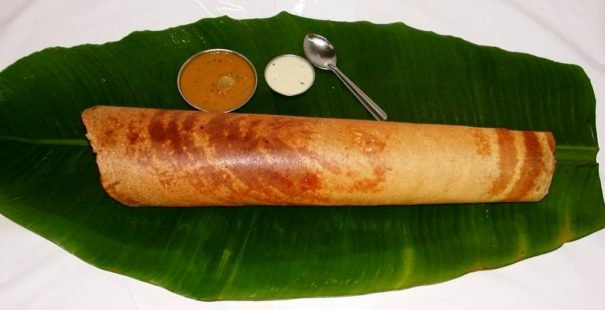
Where Eating Only Two Rounds of Breakfast is the Height of Rudeness

Where Eating Only Two Rounds of Breakfast is the Height of Rudeness
Ghee roast dosa in Chembur
I am at a table with three strangers. We don’t talk; our mouths are busy shoveling down idlis, wadas, and upma. The only sounds we make come from the cracking of a crisp dosa, and the slurp of hot filter coffee.
A waiter hovers, ready to refill our bowls with ladles of fragrant sambhar. The thin and tangy vegetable stew coats the idlis (steamed lentil rice cakes) on my plate, giving them an orange tint. In another bowl, the soup-like rasam, made with tamarind juice, tomato, chilies, and spices, soaks through the medu wada (crisp fritters made with urad dal), softening them up. I wipe both dishes clean, resisting the urge to lick my fingers.
In Mumbai, there’s cheap and then there’s “lunch home” cheap. Mani’s Lunch Home, or Mani’s, falls in the latter category. Nothing on their menu costs over 150 rupees. The 80-year-old institution serves simple, homely, vegetarian South Indian food. Last year, it shut down its Matunga outlet and moved to the eastern suburbs of Chembur.
I visit the new digs for a late breakfast. It takes time getting used to the white walls, metal chairs, and air-conditioned interiors. The old Mani’s felt like a friend’s dining room, warm and inviting. Here, under the glare of white lights, the four of us sharing a table are extremely conscious of each other. We sit properly, without fidgeting. But once our orders arrive, all propriety is forgotten, and we dig in.
My ghee roast dosa is paper thin and crumbles as I break into it, revealing a mound of masala (boiled potatoes with onion and tempered with mustard and curry leaves). In between bites, I pour the filter coffee from the stainless steel tumbler into the cup, cool it, and take small sips. It is milky and sweet enough to jolt me awake.
Eating at a lunch home is a lesson in portion control. I barely wipe the last drop of sambhar from the plate, when a hand materializes out of nowhere and fills it up. After two rounds, I feebly wave the waiter away. He is understandably surprised. Whoever says no to extra, and free, servings?
By now, I’m regretting all the food I’ve ordered. I can’t finish it all. My fellow diners have finished up, paid and left. They know their limits. They also know that you don’t waste time at a lunch home; you eat as quickly as you can and leave, making way for other hungry diners.
As I pay the bill, the owner, K.S. Narayanaswamy, walks over for feedback. I am full of praise, but he isn’t convinced. He saw me wave away extra helpings. “You didn’t finish your paper dosa,” he says, accusingly. I sheepishly apologize, promising to return and do justice to everything I order.